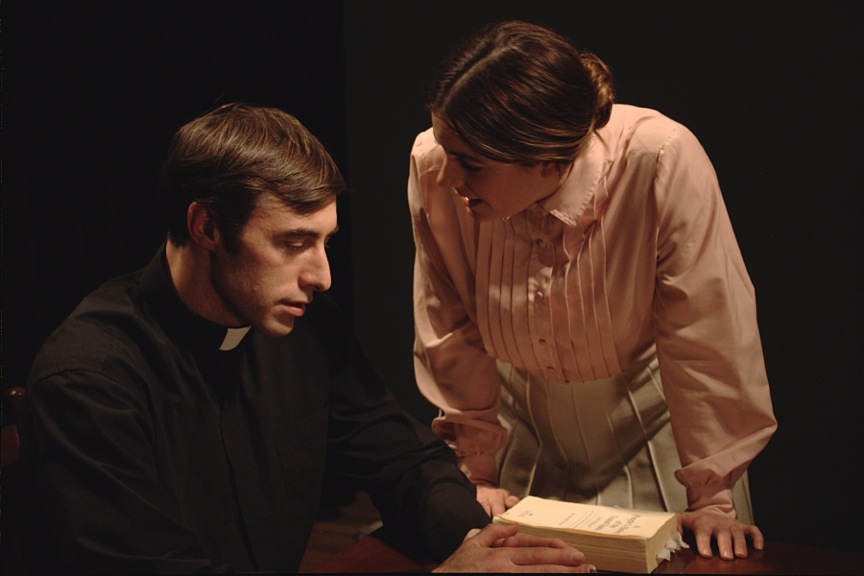 Set in the times of the Vietnam War, “Incendiary Agents†is a play written by Jack Carp, which, dealing with war and peace, law and violence, and family versus duty, has both historical and universal meaning. The action moves quickly and leaves a long-lasting impression on modern Americans, for whom the Vietnam War is history, while the wars in Iraq and Afghanistan are not, yet.
Set in the times of the Vietnam War, “Incendiary Agents†is a play written by Jack Carp, which, dealing with war and peace, law and violence, and family versus duty, has both historical and universal meaning. The action moves quickly and leaves a long-lasting impression on modern Americans, for whom the Vietnam War is history, while the wars in Iraq and Afghanistan are not, yet.
The show’s program begins with Jack Carp’s “Playwright’s Note,†which reveals that the plot of “Incendiary Agents†is based on real events of 1967, “when four men, led by Jesuit priest Philip Berrigan, strode into the Baltimore Customs House and poured blood on draft files in protest against the Vietnam War.†The conspirators in the play are four men and one woman, whose agenda is to inspire others to rebel against the mandatory drafts for young Americans. Instead of pouring blood, however, they decide to burn the papers, saving, at least, a few teenagers from enlistment. Among the saboteurs are two brothers, Father Patrick (Alexei Bondar) and Jimmy (Josh Sienkiewicz), whose nephew and son, Ryan, is currently serving in Vietnam, and it has been 39 days since the last time they received a letter from him.
In addition to being a person of flesh and blood, every character in the play embodies an idea as well. Patrick stands for what is right, or humane. When arrested, he cites the Bible in response to the interrogator’s words about the law. Patrick is convinced that “violence is always wrong,†whether or not it is illegal, and he explains his actions as “choosing to burn paper instead of people.†The young priest is an incendiary agent himself. He is a motivational speaker with the power to convince people. He is as thin as a broomstick, with large melancholy eyes and disheveled hair.
When not preaching, Patrick collects food donations for poor children together with his beloved Nancy (Jamie Neumann) and his sister-in-law, Mary (Laura Pruden). The former represents the feminist voice in the play, while the latter becomes the symbol of motherhood. Both are strong women, but their views on life are radically different. Nancy wants to be a part of the protest; it is important for her to do something for the society. Mary, on the contrary, lives for the family and people around her. She believes that helping the world starts in one’s own neighborhood.
As an antagonist for the passionate protesters, Agent Drew (Eric Rice) represents the law; he is the symbol of mind against emotions. He works for the FBI, and he puts the needs of the government above those of his family. Agent Drew’s credo is opposite to Patrick’s. Trained to repress his emotions for the sake of duty, he says, “My job is not to worry about what’s right; my job is to worry about what’s legal.†During the first interview with Patrick, he cites the sections of the law the saboteurs broke, whereas later he disarms the priest by quoting the Bible.
What comes naturally to Agent Drew is a struggle for many other characters in the play. The call of duty often comes into conflict with family. Jimmy, the representative of fatherhood, is given a choice: to cooperate with the government and bring his son back from Vietnam, or to stay loyal to his brother and go on with their plan. This makes us contemplate if principles are more important than people. Every character has an answer, and there is neither the right nor the wrong one.
“Incendiary Agents†might be compared to riding a rollercoaster- the last scene repeats the introduction, so the story is circular. However, while in the beginning of the play the audience members are clueless about what is happening- in the end we fill in all the blanks and gain fuller understanding. It shakes us, as a good rollercoaster ride should, and it leaves us a lot to ponder whether we are interested in politics or not.

Leave a Reply